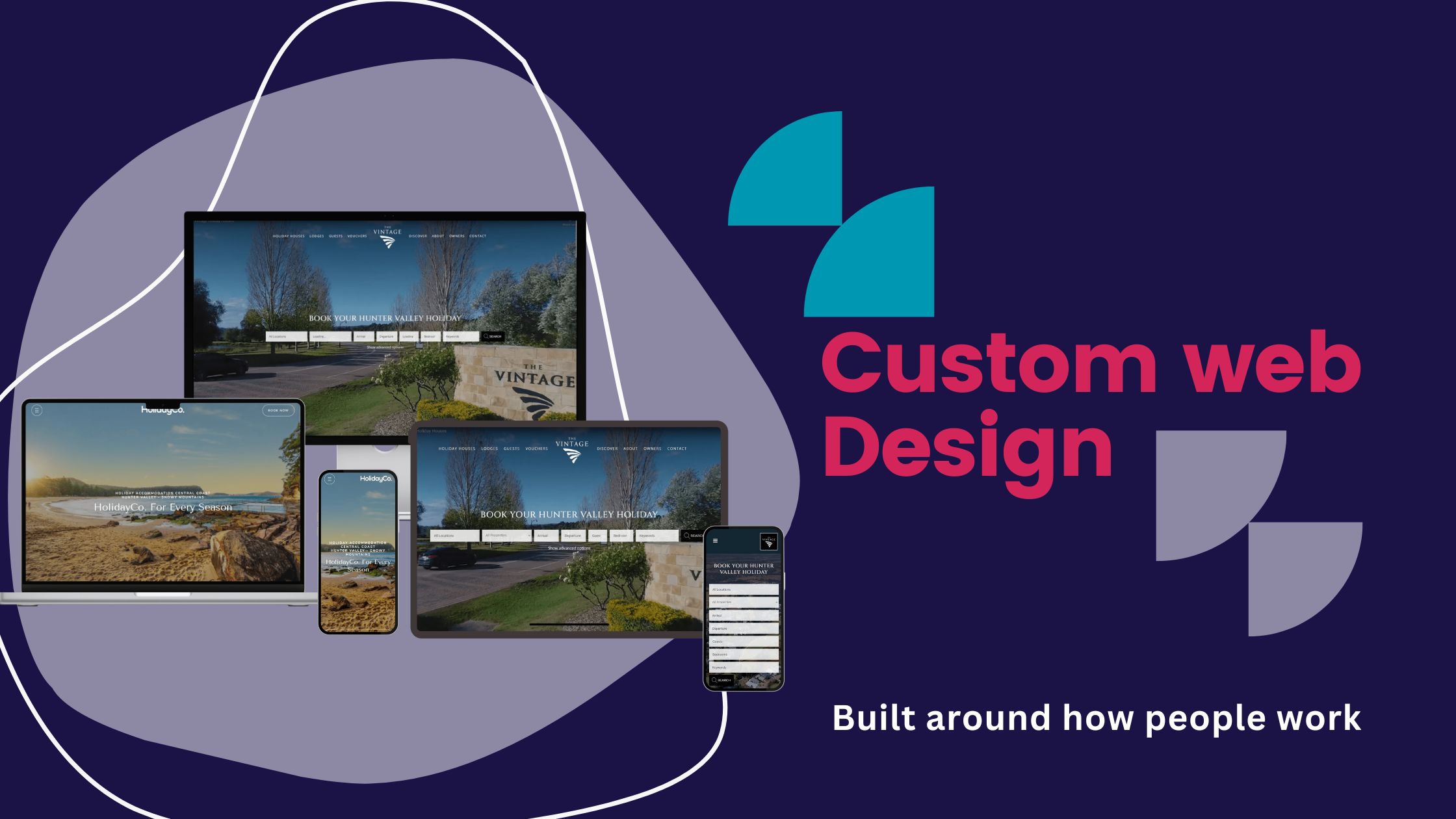The Pros & Cons of DIY Website Builders vs Professional Web Developers
The digital era has brought with it a change in the way we create and manage websites. Gone are the days when building a website was a daunting task, reserved for those with extensive html coding knowledge. The emergence of DIY website builders has made web design more accessible, providing a user-friendly platform for anyone to establish their online presence. These builders are increasingly favoured by entrepreneurs starting new ventures and small business owners looking to broaden their digital footprint. They promise ease, speed, and affordability, but at what cost to quality and effectiveness?
At Central Coast Websites, we pride ourselves on being more than just another web development and digital marketing agency. Since 2004, our journey has been about mastering the art of creating successful online platforms for businesses. Our team, consisting of skilled web developers and digital marketing professionals, is committed to understanding and implementing the intricate nuances of effective web development. We don’t just build websites; we tailor digital solutions that engage audiences and comply with Google’s standards for high-quality, authoritative online content.
In this post we aim to shed light on an important decision many businesses face: choosing between template-based DIY website builders and professional web development services. While DIY solutions may seem attractive at first glance, we believe that the expertise and personalised approach of professional developers offer unparalleled advantages, especially in terms of optimisation. Let’s look at the pros and cons of DIY website builders vs professional web developers, uncovering the nuances of each option and guiding you toward making an informed decision for your online success.
Overview of DIY Website Builders.
DIY website builders like Wix, Go Daddy, Webflow and Squarespace (to name a few) have revolutionised the way individuals and small businesses approach website creation. These platforms offer a user-friendly experience that eliminates the need for extensive technical knowledge. Their allure lies in the simplicity they offer – imagine building a website as easily as you would assemble a puzzle.
The cornerstone of these builders is their template-based design. Users can choose from a variety of pre-designed templates, each catering to different styles and industries. This approach significantly reduces the time and effort required to launch a website. The drag-and-drop interfaces further simplify the process, allowing users to add, remove, and customise elements on their website with just a few clicks. No coding is required, making these builders incredibly accessible to those without a background in web development.
Typically, DIY website builders are favoured by individuals, freelancers, and small businesses looking to establish an online presence quickly and without a significant investment. They are ideal for launching simple sites like portfolios, blogs, small e-commerce platforms, or informational pages for small businesses. These tools are designed to cater to users who prioritise ease of use, speed, and cost-effectiveness over bespoke design and advanced functionalities. However, as we will explore further, this convenience can come with limitations, especially when it comes to customisation and search engine optimisation (SEO).

Pros and Cons of DIY Website Builders.
When considering DIY website builders, it’s essential to weigh their advantages and disadvantages to understand their suitability for your specific needs.
Advantages
- Cost-Effectiveness: One of the most appealing aspects of DIY website builders is their affordability. Many offer free basic plans or low-cost options, making them a budget-friendly choice for startups and small businesses. They have a monthly pricing plan with nothing to pay upfront.
- Ease of Use: With user-friendly interfaces, these platforms cater to those without technical skills. The drag-and-drop functionality simplifies the web design process, making it accessible to anyone regardless of their web development expertise.
- Quick Setup: Time is a crucial factor for many businesses. DIY website builders allow for rapid deployment of websites. You can have a functional website up and running in a matter of hours, which is a significant advantage for businesses needing an online presence promptly.
Disadvantages
- Limited Customisation: While templates offer ease of use, they also restrict creativity and uniqueness. There’s a risk of your website looking generic or similar to numerous others, which can be a drawback for businesses looking to stand out in a crowded digital space.
- Potential for Poor SEO: DIY builders often fall short in the realm of search engine optimization. Limitations in customising the backend of the site, such as meta tags, structured data, and other SEO essentials, can hinder a website’s ability to rank well on search engines like Google.
- Lack of Technical and Professional Support: While some DIY platforms provide basic customer support, they lack the personalised, ongoing technical and strategic support that professional web developers offer. This can be a significant drawback when complex issues arise or when you need strategic advice to grow and evolve your website in line with your business goals.
While DIY website builders offer a quick and cost-effective solution for getting online, they come with limitations that can impact the long-term effectiveness and uniqueness of your website. It’s these limitations that often lead businesses to consider the benefits of professional web development services.
The Case for Professional Web Developers.
Professional web development is distinguished by a unique combination of technical skill, creative vision, and strategic insight. Unlike the straightforward approach of DIY website builders, professional web developers offer a depth of expertise that encompasses not just coding, but also custom design, user experience optimisation, and advanced search engine optimisation (SEO). The role is expansive, focusing on creating a comprehensive digital presence that effectively communicates a brand’s identity and achieves the specific goals of a business, while adding the right functionality to the website to ensure an outstanding user experience (UX).
At Central Coast Websites, we take pride in our multifaceted approach to web development. Established in 2004, our journey has been about more than just keeping up with digital trends; it’s been about innovating and leading in the web development and digital marketing space. Our team consists of experienced professionals who bring a diverse set of skills and a forward-thinking mindset to each project. Our commitment is to crafting custom, engaging websites that are not only aesthetically pleasing but also strategically optimised for search engines and aligned with our clients’ unique requirements.
Our track record showcases our expertise and dedication. We have successfully delivered websites that enhance online visibility and drive business growth, catering to a wide range of clients from small local businesses to larger corporations. Each project in our portfolio is a reflection of our commitment to excellence and our focus on delivering tangible, measurable results.
The true value of working with professional web developers like us lies in our comprehensive, tailored approach. This approach extends beyond mere website functionality, encompassing strategic planning, continuous support, and an in-depth understanding of how to excel in a competitive online environment.

Pros and Cons of Hiring Professional Web Developers.
Choosing to work with professional web developers is a significant decision for any business. This choice comes with its own set of advantages and disadvantages, which are important to understand to make an informed decision.
Advantages
- Custom Design: Professional web developers offer bespoke design services, creating a website that is not only unique but also tailored to the specific branding and needs of your business. This customisation extends beyond aesthetics, encompassing user experience and functionality that align with your business objectives.
- Technical Expertise: With professional developers, you have access to a wide range of technical skills and experience. This includes advanced coding, integration of various technologies, and the creation of responsive, fast-loading websites. Their expertise ensures that your website is robust, secure, and optimised for all devices.
- SEO Optimisation: A key advantage of professional web development is the focus on SEO. Developers can implement advanced SEO strategies, ensuring your website is not only visually appealing but also ranks well on search engines. This is crucial for online visibility and attracting your target audience.
- Ongoing Support: Professional web development usually includes continuous support and maintenance. This means you have experts on hand to update your website, fix any issues, and adapt the site as your business grows and evolves.
Disadvantages
- Higher Cost: Custom web development typically comes with a higher price tag compared to DIY website builders. The cost reflects the expertise, personalised service, and time invested in creating a website that’s specifically designed for your business needs.
- Longer Development Time: Unlike the immediate setup offered by DIY builders, professional web development takes more time. This is due to the process of designing, developing, testing, and optimising a custom website to ensure it meets all your requirements and standards.
While hiring professional web developers may require a larger investment and more development time, the advantages they bring to the table – custom design, technical expertise, SEO optimisation, and ongoing support – are often crucial for businesses looking to establish a strong and effective online presence.
Future Trends: Anticipating Changes in Web Development
The field of web development is continually evolving, with both DIY website builders and professional web development spheres witnessing significant innovations. Staying abreast of these trends is crucial for businesses aiming to maintain a competitive edge in the digital landscape.
Innovations in DIY Website Building
- AI and Automation: DIY website builders are increasingly integrating AI and automation tools. These advancements can simplify design choices, automate SEO basics, and even provide content suggestions, making the process faster and more intuitive for users.
- Advanced Customisation Options: To bridge the gap between professional and DIY solutions, many website builders are expanding their customisation options. This includes more sophisticated templates, enhanced design flexibility, and improved tools for mobile optimisation.
- Integration of E-commerce and Marketing Tools: There’s a growing trend towards incorporating comprehensive e-commerce and digital marketing functionalities directly into DIY platforms, making it easier for businesses to manage their online sales and marketing efforts from a single platform.
The Importance of Optimisation.
In the digital world, the success of a website hinges significantly on its optimisation. Search Engine Optimisation in digital marketing and web development is multifaceted, encompassing technical, on-page, and content aspects, each playing a crucial role in enhancing a website’s performance and visibility.
Types of Optimisation
- Technical Optimisation: This involves improving the technical aspects of a website to ensure it’s fast, secure, and accessible. It includes optimising site speed, ensuring mobile responsiveness, securing the site with HTTPS, and improving the website’s architecture for better crawling and indexing by search engines.
- On-Page Optimisation: On-page optimisation refers to optimising individual web pages to rank higher in search engines. This includes optimising page titles, meta descriptions, headers, and ensuring that the content is relevant and provides value to the intended audience. Proper use of keywords and creating a user-friendly experience are also key elements.
- Content Optimisation: Content is king in the digital marketing world. Content optimisation is about creating high-quality, engaging, and informative content that is tailored to the target audience. This also involves the strategic use of keywords, multimedia enhancements, and ensuring the content aligns with user intent and search engine guidelines.
Role in Google Ranking and Online Visibility.
Optimisation plays a pivotal role in determining a website’s ranking on search engines like Google. Google’s algorithms prioritise websites that offer the best user experience, which is largely determined by how well a website is optimised in these areas. Well-optimised sites are more likely to rank higher, leading to increased visibility, more traffic, and, ultimately, higher conversion rates.
Limitations of DIY Builders in Achieving Optimal Optimisation.
While DIY website builders have made strides in offering some level of optimisation, they often fall short in achieving the depth of optimisation provided by professional web development. Limitations in technical optimization, such as slower loading speeds and less responsive designs, are common. Additionally, the on-page and content optimization options in DIY builders are typically not as extensive as those available to professional developers. These limitations can hinder a website’s ability to rank well on search engines and can impact the overall effectiveness of the site.
The importance of comprehensive optimisation cannot be overstated in the quest for online success. While DIY website builders offer a starting point for optimisation, professional web development services provide a more thorough and effective approach, critical for businesses aiming to excel in the highly competitive digital landscape.

Emerging Trends in Professional Web Development.
- Progressive Web Apps (PWAs): Professional web development is increasingly focusing on the creation of PWAs. These web applications offer a high-quality user experience, combining the best of web and mobile app features. They are fast, reliable, and can work offline, improving user engagement.
- Voice Search Optimisation: With the rise of digital assistants, optimising websites for voice search is becoming more important. Professional web developers are focusing on creating content that aligns with conversational language and long-tail keywords to cater to this trend.
- Enhanced Security Measures: As cyber threats evolve, so does the need for robust security in web development. Professionals are incorporating advanced security protocols and encryption techniques to protect websites and user data.
- Sustainable Web Design: There’s an emerging focus on sustainability in web development. This includes creating energy-efficient websites, optimising server performance, and reducing the overall digital carbon footprint.
Both DIY website builders and professional web development are adapting to these trends, each in their own way. While DIY solutions are becoming more sophisticated and user-friendly, professional web development is focusing on advanced technologies and strategic implementations. These evolving trends highlight the dynamic nature of the web development industry and the importance of staying informed and adaptable.
The Verdict on DIY vs. Professional Web Development.
In this article looking into the pros and cons of DIY website builders versus professional web development, we have gone through various facets that influence the effectiveness and success of an online presence. The allure of DIY website builders lies in their cost-effectiveness, ease of use, and quick setup. However, these advantages often come with significant limitations, including restricted customisation, potential SEO shortcomings, and a lack of comprehensive technical and professional support.
On the other side of the spectrum, professional web development, as showcased by our experiences at Central Coast Websites, offers a tailor-made approach. With custom design, advanced technical expertise, strategic SEO optimisation, and ongoing support, professional services equip businesses with a robust and dynamic online presence. The case studies presented underscore the transformative impact of professional web development, highlighting improved performance, enhanced user experience, and greater online visibility.
The digital landscape is constantly evolving, and staying ahead in this competitive arena requires more than just a functional website. It demands a strategic, well-optimised, and professionally crafted digital platform – one that resonates with your audience, reflects your brand’s identity, and achieves your business goals.
We encourage you to reflect on the needs and aspirations of your digital presence. If you are seeking a distinctive, efficient, and impactful online presence, professional web development is not just an option; it is a necessity. At Central Coast Websites, we are dedicated to translating your digital aspirations into reality.




